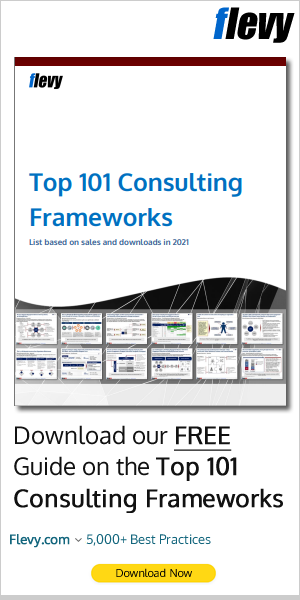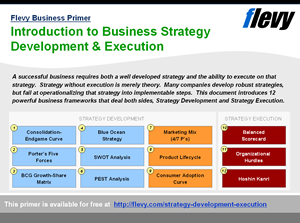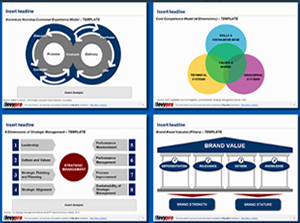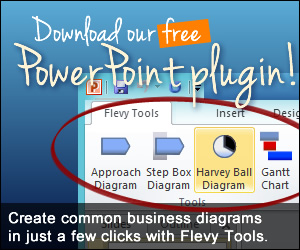Success in business isn’t about being the cheapest—it’s about building an edge that lasts. Competitive Advantage drives long-term Performance, whether through lower costs, superior quality, or innovative differentiation. Michael Porter took this concept beyond companies, arguing that nations and industries also shape their competitive positions in global markets. His Diamond Model explains why certain industries […]
About Mark Bridges
Mark Bridges is a Senior Director of Strategy at Flevy. Flevy is your go-to resource for best practices in business management, covering management topics from Strategic Planning to Operational Excellence to Digital Transformation (view full list here). Learn how the Fortune 100 and global consulting firms do it. Improve the growth and efficiency of your organization by leveraging Flevy's library of best practice methodologies and templates. Prior to Flevy, Mark worked as an Associate at McKinsey & Co. and holds an MBA from the Booth School of Business at the University of Chicago. You can connect with Mark on LinkedIn here.Author Archive | Mark Bridges

Porter’s Diamond Model

Dynamic Capabilities Framework
Strategy hasn’t stood still. It has evolved alongside industries, shifting from static competitive positioning to a more fluid, adaptive approach. Early Strategy models focused on industry forces and market positioning. Then came the Resource-Based View (RBV), arguing that sustained success comes from leveraging unique internal resources rather than just reacting to market dynamics. RBV, dominant […]

APICS Supply Chain Manager Competency Model
The APICS Supply Chain Manager Competency Model provides a structured framework for developing supply chain professionals in an increasingly complex global landscape. As digitalization, sustainability, and geopolitical risks reshape supply chains, organizations face a widening skills gap. Many professionals lack expertise in data analytics, technology, and risk management, leading to operational inefficiencies. Without a standardized […]

Innovation-Ambition Matrix
Innovation is no longer a luxury—it’s survival. Organizations that fail to innovate, stagnate. It’s that simple. The challenge isn’t just coming up with ideas but knowing which ones to pursue and how to allocate resources effectively. That’s where the Innovation-Ambition Matrix steps in. This framework helps leaders balance incremental improvements, market expansion, and transformative breakthroughs, […]

Triple-A Framework
If your supply chain strategy still revolves around cost-cutting and efficiency, you’re already losing. The world has changed. Disruptions—geopolitical chaos, supply shortages, sudden demand shifts—aren’t rare exceptions. They’re the new normal. The old supply chain models weren’t built for this. They crack under pressure, leaving organizations scrambling to recover. Meanwhile, a select few—companies like Apple, […]

Difficult Conversations Framework
Difficult conversations are the moments most people dread yet cannot avoid. Whether addressing a performance issue with a team member, negotiating a raise, or confronting a personal conflict, these discussions carry high stakes and strong emotions. The ability to navigate them effectively defines leadership, fosters trust, and ultimately determines the strength of relationships—both professional and […]

Selling through Curiosity Framework
In the ever-evolving sales landscape, curiosity plays a pivotal role in establishing meaningful connections with customers. It is more than just a trait. It is a strategic tool that sales professionals can leverage to understand their clients’ needs deeply. By fostering a culture of curiosity, sales teams can enhance their ability to engage customers, leading […]

The Challenger Sales Model
The sales world is no stranger to evolution, and the Challenger Sales Model stands as a landmark approach to navigating today’s complex, insight-driven markets. Developed by Matthew Dixon and Brent Adamson, this model shifts the focus from relationship-building to challenging customer perceptions with fresh insights and tailored solutions. Introduced in their seminal book, “The Challenger […]

Lean Digital Transformation
The concept of “Lean,” originating from the Toyota Production System of the 1940s, revolutionized operations by emphasizing efficiency, waste reduction, and continuous improvement. These principles have found their way across industries, fostering streamlined workflows and customer-centric strategies. However, the digital age demands evolution. Enter Digital Lean—a fusion of traditional Lean methodologies with advanced technologies, delivering […]

Gamification: The Octalysis Framework
The Octalysis Framework, developed by Yu-kai Chou, is a sophisticated consulting framework designed to enhance engagement through the strategic use of gamification. It identifies 8 core drives that underpin human motivation, enabling organizations to transform routine interactions into compelling experiences. With applications spanning industries like education, healthcare, and corporate environments, Octalysis offers a structured pathway […]

Digital Twin Technology Framework
Digital Twins are reshaping the way organizations approach Operations and Innovation. By providing a virtual replica of a physical system, process, or product, Digital Twins enable organizations to monitor, simulate, and optimize real-world performance with unprecedented precision. This technology leverages real-time data from sensors and other sources to mirror physical behavior, unlocking new efficiencies and […]

Sustainable Value Framework
The Sustainable Value Framework represents a strategic approach that integrates the goals of People, Planet, and Profit, pushing organizations to evaluate their role in society by creating value not only economically but also socially and environmentally. Originating from environmental principles, sustainability now tackles challenges across all sectors—promoting practices that fulfill present needs while safeguarding resources […]













